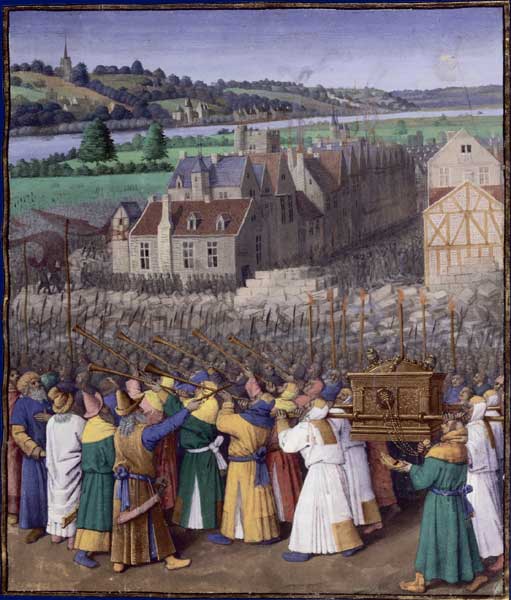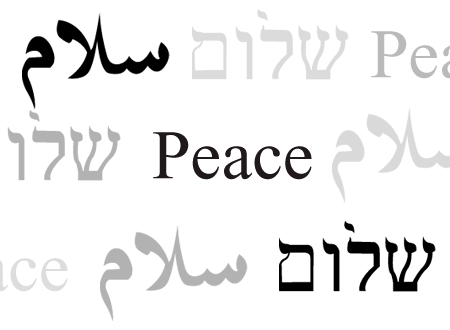Last updated on June 21, 2014
Part One Covers Pacifism and Herem in the Jewish tradition.
Part Two Covers Wars of Necessity and the Rules outlining said wars.
Part Three Covers Modern Rabbinical Interpretations.
Introduction
War is an inevitable struggle in human life. Every civilization, at some point, has violent conflict in both their ancient and modern day incarnations. Such historic narratives, of course, also involve this constant conflict, both from the standpoint of glorification as well as remorse. Every nation has a love/hate relationship with war. We seem to see ourselves on a high horse when it comes to “peace” when we’re no more prone to avoid the same mistakes in different avenues. This relation is no more apparent than in the case of Israel.
Throughout the tanakh, there are numerous examples of wars commanded by God, wars fought out of self-defense, calls for peace – all of which, to some degree, contradict each other’s intentions. This is not to mention further halakha by rabbis and the like regarding these narratives – not only have they changed the current understanding of these wars, but have developed moral and legal limits for war that go far beyond the original text. Thus, the war tradition of Judaism is a complicated entity. The kinds of war in the Judaic tradition, milhemet herem/mitzvot, milhemet hovah, and milhemet reshut each arrive from specific situations within the Hebrew Bible. Thus, a thorough examination of each kind of war, as well as pacifism and modern interpretations, are practically a requirement. Definite conclusions, however, are not necessary; a plurality of views towards war still exist in Judaism, and that is no less the case here.
Pacifism
First, it is important to recognize pacifism in Judaism. However, pacifism, at least in terms of the Torah, does not exist in the Judaic tradition at all. Since Israel has never had a chance to develop as a nation apart from conflict, a developed tradition has never arisen – even in the modern state of Israel, they are always under attack, whether by armies or terrorism. Thus, pacifism has never entered the narrative for obvious reasons: the need for self-defense outweighs any thoughts of total peace (one cannot be peaceful if one is denied the right to exist). Even so, war can never be the main objective. Michael Brodye, a Orthodox rabbi and professor at Emory University, states:
There is one element of pacifism that is clearly found in the Jewish tradition: the minimization of violence. In nearly all situations where Jewish law allows violence to prevent an evil from occurring, it mandates that the minimal amount of violence be used which accomplishes one’s goal. Thus, if one can stop a murderer from committing his crime without the use of deadly force, deadly force is prohibited; if one can separate combatants without using physical force, non-violent means are certainly preferred. Judaism accepted that it is best not to use violence, and violence was the last resort — but when no other action would suffice, violence was morally acceptable and typically mandatory.1
There are specific Talmudic reasons for supporting this view. According to Brodye,
Jewish law commands (compels) one to save the life of one who is being murdered even if it is necessary to do so at the expense of the life of the murderer; the Talmud commands that one should have no mercy on the murderer and take his life if needed — indeed this is true even if the murderer could not be punished by a court for his crime after the fact (for example, if the murderer were a minor)2
Leviticus 19:6 has been used, in general, to support this view:
You shall not go about as a slanderer among your people, and you are not to act against the life of your neighbor; I am the LORD.
Later interpretation has found that such a command has a two-fold meaning – even though force remains illegitimate, it is allowed in circumstances where another person is under attack; in other words, force is allowed against a person who is using force “improperly”, contrary to God’s law. War has never been viewed as a “means to an end”, nor as a simple pragmatic tool. Those who go to war under the covenant desire peace as much as they take effort to enact war. The peace of Judaism is shalom, not a simple cease-fire but a just and lasting peace of integrity, righteousness, and wholeness. All Jews are required to pursue tikkun olam, to repair and heal the world, by actively working for social justice. Thus, the objective of any force taken under the law is for peace first and foremost.

Herem: The War of the Ban
This emphasis on peace, however, still affirms the necessity of wars. Milhemet herem/mitzvot, known as either “wars of the ban” or “wars of obligations,” permeate the Hebrew Bible. Although they have been called “holy wars”, to equate them to the modern day concept of the Islamic Wahhabists (such as al-Qaeda) is disingenuous at best. Even within the tanakh, there is a wide variety of “holy wars” that God had enacted. Breaking down the terms involved will shed light on their conception. Milhemet means “war” – that much is obvious. However, herem is the key – this has been translated to mean “absolute destruction”, “the ban” or “a holocaust”. Combining the words together, a holy war is, literally, a war of total destruction. In Deuteronomy 20: 16-18, herem is used specifically to denote God’s command to Israel:
Only in the cities of these peoples that the LORD your God is giving you as an inheritance, you shall not leave alive anything that breathes, but you shall utterly destroy them, the Hittite and the Amorite, the Canaanite and the Perizzite, the Hivite and the Jebusite, as the LORD your God has commanded you, so that they may not teach you to do according to all their detestable things which they have done for their gods, so that you would sin against the LORD your God.
What does “total destruction” constitute? First, total destruction consists of genocide against a particular race. There are no exceptions to the rule. Second, anything that is not killed during the battle must be killed after the battle, women and children included. Third, all livestock must be killed as well. Obviously, these are barbaric acts by any stretch of the imagination; however, the point of these wars was for Israel to trust in their God. God fought the battles for them – literally, God was the commander of the Israelite army on the battlefield – and thus, He sets the terms by which they could take territory. In addition, the Torah texts claim that God wanted to keep the Israelites away from foreign gods that were worshiped by the local peoples – thus, to eliminate them would remove that threat to God’s sovereignty over His people. Thus, the primary purpose for these wars was to exemplify God’s power. He makes it clear that
…I sent the hornet before you and it drove out the two kings of the Amorites from before you, but not by your sword or your bow. Joshua 24:12
The herem was a sacrifice of all the spoils of war to God, and God had any booty set on fire. The ban was only practiced on cities that resisted the Israelites. Violating the ban brought grave consequence, as in the story of Achen in Joshua 7. An Israelite, Achen stole precious spoils from Jericho – however, once his actions were found out, himself, his family, and all his possessions were stoned to death and burned as befitting the ban. The Israelite king Saul also incurred the wrath of God by sparing Agag, the king of the Amalekites whom Saul was to destroy completely (I Samuel 15). Samuel the prophet exacted God’s commandment in this case, and Saul, according to the Hebrew Bible, eventually lost his kingship and his life. Lastly, these wars of “absolute destruction” can only be waged within a particular territory as explicated by Exodus 23:31:
I will fix your boundary from the Red Sea to the sea of the Philistines, and from the wilderness to the River Euphrates; for I will deliver the inhabitants of the land into your hand, and you will drive them out before you.
Numbers 34:3-12 further delineate this area (wall of text incoming!):
Your southern sector shall extend from the wilderness of Zin along the side of Edom, and your southern border shall extend from the end of the Salt Sea eastward. Then your border shall turn direction from the south to the ascent of Akrabbim and continue to Zin, and its termination shall be to the south of Kadesh-barnea; and it shall reach Hazaraddar and continue to Azmon. The border shall turn direction from Azmon to the brook of Egypt, and its termination shall be at the sea. As for the western border, you shall have the Great Sea, that is, its coastline; this shall be your west border. And this shall be your north border: you shall draw your border line from the Great Sea to Mount Hor.You shall draw a line from Mount Hor to the Lebo-hamath, and the termination of the border shall be at Zedad; and the border shall proceed to Ziphron, and its termination shall be at Hazar-enan. This shall be your north border. For your eastern border you shall also draw a line from Hazar-enan to Shepham, and the border shall go down from Shepham to Riblah on the east side of Ain; and the border shall go down and reach to the slope on the east side of the Sea of Chinnereth. And the border shall go down to the Jordan and its termination shall be at the Salt Sea. This shall be your land according to its borders all around.
This limitation ensured that herem would only occur within the land originally promised to Abraham and his progeny; these were part of the covenant agreement, after all, and God held His end of the bargain if the Torah was any indication. As far as history has showed, the herem has not been enacted in recent times due to the rise of rabbinical Judaism, whose interpretation of the Torah have led to different applications to modern life. While the concept itself has not changed, and the barbarism of such acts have been rejected in modern Israel, the theological implications – total devotion to God and his covenant – remain vital.
——
1+2 Michael Brodye, “Fighting the War and the Peace: Battlefield Ethics, Peace Talks, Treaties, and Pacifism in the Jewish Tradition,” Jewish Law: Examining Halacha, Jewish Issues, and Secular Law, http://www.jlaw.com/Articles/war1.html.

